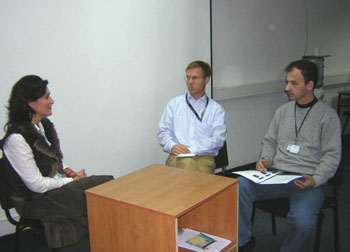Ted Feifer led a workshop in advanced negotiation and problem solving for 23 international and national staff members of the OSCE Mission in Kosovo, in Pristina December 6-7, 2006. Workshop objectives were to refresh and reinforce negotiation and diplomatic skills, by helping participants become more effective in crucial conversations, understand and manage emotions in negotiations, and strengthen skills in group practical problem-solving.
Ted Feifer led a workshop in advanced negotiation and problem solving for 23 international and national staff members of the OSCE Mission in Kosovo, in Pristina December 6-7, 2006. Workshop objectives were to refresh and reinforce negotiation and diplomatic skills, by helping participants become more effective in crucial conversations, understand and manage emotions in negotiations, and strengthen skills in group practical problem-solving.
Participants took part in videotaped role-plays developed for the OSCE Mission’s new municipal team monitoring strategy, and analyzed their effectiveness in using key communication and negotiation skills. They also engaged in interactive discussions of strategies for dealing with emotion in negotiation. In addition, participants engaged in group practical problem solving of sensitive current Kosovo issues.
According to one participant: “The workshop was conducted at a very professional level. During our daily work we are facing lots of issues that will be easier to work out and to try to solve after this training.” Another summed up the view of many other participants: “I found the workshop useful for my daily work.”



